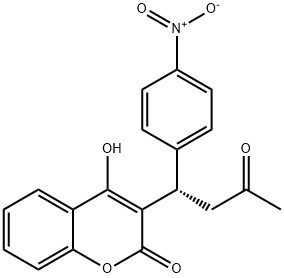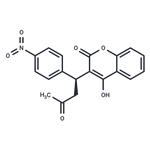Acenocoumarol is a short-lived oral anti-coagulant, which, like warfarin, functions by inhibiting vitamin K epoxide reductase. It has higher intrinsic anticoagulant potency than warfarin and phenprocoumon, when evaluated in vitro. Acenocoumarol has a single chiral center that gives rise to two different enantiomeric forms. (S)-Acenocoumarol has a shorter plasma elimination half-life (1.8 hours) and faster plasma clearance (28.5 L/hour), compared to the (R)-enantiomer (6.6 hours, 1.9 L/hour). The S-enantiomer undergoes extensive first-pass metabolism during absorption from the gastrointestinal tract, whereas (R)-acenocoumarol is rapidly absorbed and provides essentially complete oral bioavailability. Perhaps related to these pharmacokinetic characteristics, (S)-acenocoumarol is less potent in vivo as an anti-coagulant than the (R)-enantiomer. As the clearance of acenocoumarol is ~20-fold faster than that for warfarin, the plasma concentrations of acenocoumarol are substantially lower than those for warfarin in patients receiving long-term treatment.

